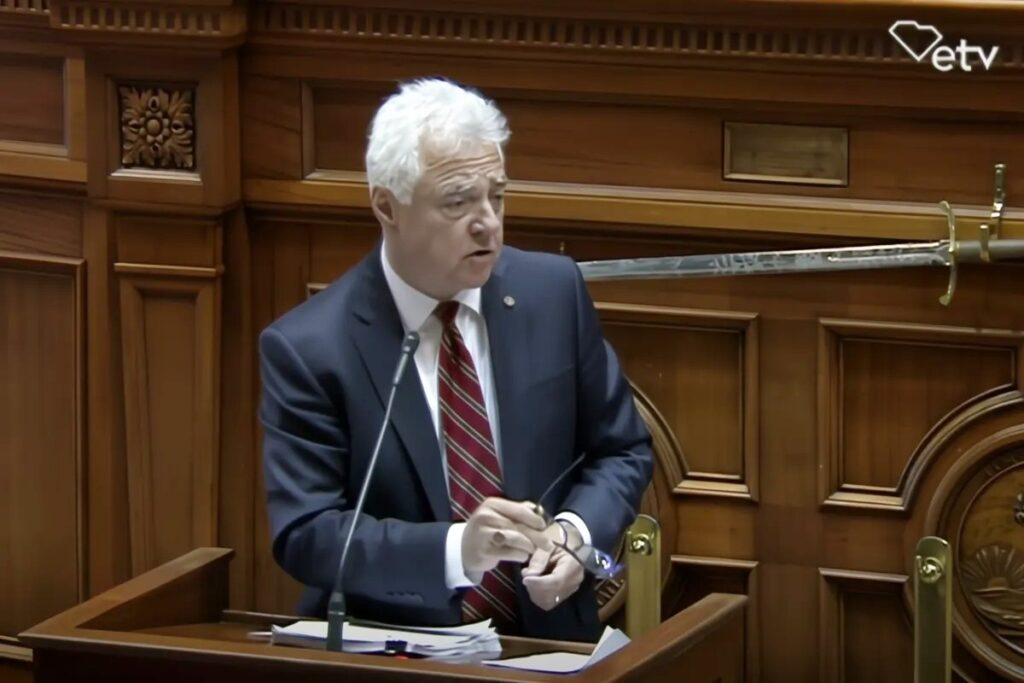
By Andy Brack | The late Gonzo journalist Hunter S. Thompson observed more than 50 years ago that “when the going gets weird, the weird turn pro.”
Now is that time in South Carolina. The weird turned pro in Columbia in a week when a Senate subcommittee report on the odd happenings of a $1.8 billion accounting error caused more fingers to be pointed than at a pop concert.
 In the hot seat is State Treasurer Curtis Loftis, who senators blame for not being able to explain or reconcile a state account with $1.8 billion in it. As Charleston City Paper reporter Jack O’Toole described earlier this week, “state accountants cannot say where the money came from or who it belongs to.”
In the hot seat is State Treasurer Curtis Loftis, who senators blame for not being able to explain or reconcile a state account with $1.8 billion in it. As Charleston City Paper reporter Jack O’Toole described earlier this week, “state accountants cannot say where the money came from or who it belongs to.”
Sheesh. Talk about a series of egg-on-face moments, particularly following last year’s abrupt resignation of S.C. Comptroller General Richard Eckstrom after admitting to a decade of errors that artificially inflated the state’s cash reserves – by $3.5 billion.
At least this new error does not appear wilful. Senators say they suspect no criminal wrongdoing. But in best CYA fashion, they note in a 116-page report, “the possibility cannot be summarily dismissed due to the size of the errors, the length of time they were concealed, and the inaccurate condition of the treasury records.”
Loftis, who has said he wouldn’t run for a fifth term (good), is having nothing much to do with the Senate and its report.
“There are no penalties for senators making false statements, and no court action available to me,” Loftis said in a statement. “I’ll not read the Senate’s report, nor will I watch the Senate proceedings, as the subcommittee’s mission is not one based on honor and integrity.”
But what may make the whole fiasco worse was an apparent threat by Loftis at one point to put highly-sensitive classified financial records online as a way to be more transparent to the committee.
Senior state officials reportedly didn’t initially take it that seriously, until all of a sudden they did, which sent them scurrying around trying to contain possible damage.
The head of the Senate subcommittee investigating the mess, Republican Larry Grooms of Berkeley County, said state Attorney General Alan Wilson and members of Gov. Henry McMaster’s staff held an emergency meeting “to find a way to stop the treasurer from publishing detailed information that would have crippled our state.”
In the end, McMaster reportedly defused the situation by phoning Loftis and talking him off the disclosure ledge.
“The governor made a direct appeal to him by telephone, asking him to please don’t do it,” Grooms told state senators this week. “The governor believed the treasurer was backing down (and) the crisis was over.”
Whew. Loftis, for his part, says his office never “lost track” of the $1.8 billion, pointing to detailed correspondence and information that’s online.
“It was part of a pool of money which the State Treasurer’s Office had always accounted for, invested and held for the state’s use,” he wrote in a clarification to Grooms on April 4.
Whatever happens next, one thing is clear: We’ve got to get rid of the weird in Columbia. The state needs smoother financial seas. Maybe the state treasurer’s job, like that of the comptroller general, doesn’t need to be an elected position any more, as outlined in the state constitution. Lawmakers need to put both positions on the November ballot to get voters’ permission to eliminate the elected positions and put them under the governor’s office.
Andy Brack is editor and publisher of Statehouse Report and the Charleston City Paper. Have a comment? Send to: feedback@statehousereport.com.



All these billion dollar conversations that noone seems accountable for, is this what some call “slippage”?
Wait a minute, here! They never “lost track” of the money they can’t account for and continue to manage and invest. That’s the quote. So how long have they been tracking and managing the taxpayers money? Could and should this money be used for something more than a fat bank account? We have homeless people, impoverished people and children that don’t have enough to eat in this state. If we just budgeted 10% of the balance each year to target those who need our help the most, that could be a worthy endeavor while they try to figure out where this windfall originated and carfully “invest and manage” the balance.
exactly